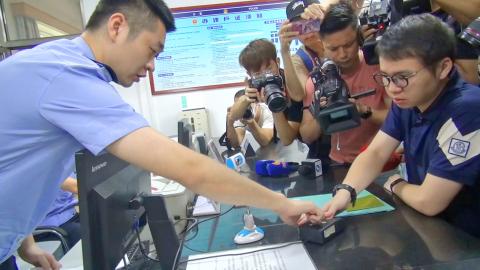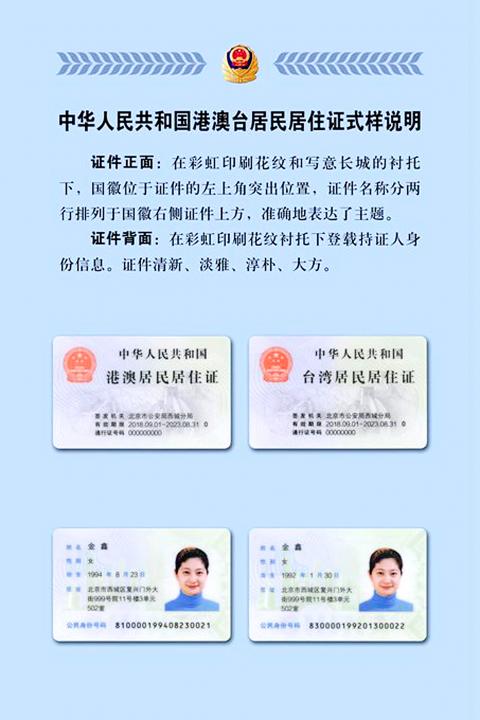Beijing’s issuing of residency permit cards for people from Taiwan, Hong Kong and Macau, which came into effect yesterday, is part of a ploy to bring Taiwan into China’s political fold, the Mainland Affairs Council said.
The cards, which carry an 18-digit code, look almost identical to Chinese identification cards and are aimed at belittling Taiwan’s sovereignty, the council said.
While Beijing has claimed that the new cards will provide Taiwanese residents in China with better access to public services, the council said that it is part of Beijing’s “united front” strategy, and would only benefit China’s agenda.

Photo: CNA
China is being irresponsible, because it has ignored public concerns over the risks card applicants might face, the council said, calling on Beijing to withdraw its “political ploy” and instead contribute to peaceful development across the Taiwan Strait.
The council has warned Taiwanese against risks to personal privacy, particularly in light of Beijing’s efforts to create a vast network of surveillance cameras and facial recognition systems as a means of social control.
The council said that it will try to find out more about the differences between the new cards, and the temporary residence cards issued to Taiwanese working and living in China.

Photo: CNA
Electronic terminals at railway stations, airports, banks and other places will be able to read the cards, making life easier for cardholders who are studying and working in China, the Chinese State Council has said.
Taiwanese do not need to have household registration in China to apply for the new card, but should have resided in China for more than six months, and must have a stable job and a place of residence.
Taiwan Democracy Watch yesterday in a statement said that by differentiating between household registrations and places of residence, Beijing is attempting to circumvent Article 9-1 of the Act Governing Relations Between the People of the Taiwan Area and the Mainland Area (臺灣地區與大陸地區人民關係條例 ), which stipulates: “The people of the Taiwan Area may not have household registrations in the Mainland Area or hold passports issued by the Mainland Area.”
Beijing would gradually force international organizations, and foreign governments and businesses to require Taiwanese to present the new cards on different occasions, forcing Taiwanese to call themselves People’s Republic of China citizens, and thereby claim jurisdiction over Taiwanese, the group said.
The government should restrict or revoke the civic rights of those who apply for the new cards, treat them as dual citizens or enact a separate law to regulate their status, it added.

US President Donald Trump yesterday announced sweeping "reciprocal tariffs" on US trading partners, including a 32 percent tax on goods from Taiwan that is set to take effect on Wednesday. At a Rose Garden event, Trump declared a 10 percent baseline tax on imports from all countries, with the White House saying it would take effect on Saturday. Countries with larger trade surpluses with the US would face higher duties beginning on Wednesday, including Taiwan (32 percent), China (34 percent), Japan (24 percent), South Korea (25 percent), Vietnam (46 percent) and Thailand (36 percent). Canada and Mexico, the two largest US trading

AIR SUPPORT: The Ministry of National Defense thanked the US for the delivery, adding that it was an indicator of the White House’s commitment to the Taiwan Relations Act Deputy Minister of National Defense Po Horng-huei (柏鴻輝) and Representative to the US Alexander Yui on Friday attended a delivery ceremony for the first of Taiwan’s long-awaited 66 F-16C/D Block 70 jets at a Lockheed Martin Corp factory in Greenville, South Carolina. “We are so proud to be the global home of the F-16 and to support Taiwan’s air defense capabilities,” US Representative William Timmons wrote on X, alongside a photograph of Taiwanese and US officials at the event. The F-16C/D Block 70 jets Taiwan ordered have the same capabilities as aircraft that had been upgraded to F-16Vs. The batch of Lockheed Martin

GRIDLOCK: The National Fire Agency’s Special Search and Rescue team is on standby to travel to the countries to help out with the rescue effort A powerful earthquake rocked Myanmar and neighboring Thailand yesterday, killing at least three people in Bangkok and burying dozens when a high-rise building under construction collapsed. Footage shared on social media from Myanmar’s second-largest city showed widespread destruction, raising fears that many were trapped under the rubble or killed. The magnitude 7.7 earthquake, with an epicenter near Mandalay in Myanmar, struck at midday and was followed by a strong magnitude 6.4 aftershock. The extent of death, injury and destruction — especially in Myanmar, which is embroiled in a civil war and where information is tightly controlled at the best of times —

China's military today said it began joint army, navy and rocket force exercises around Taiwan to "serve as a stern warning and powerful deterrent against Taiwanese independence," calling President William Lai (賴清德) a "parasite." The exercises come after Lai called Beijing a "foreign hostile force" last month. More than 10 Chinese military ships approached close to Taiwan's 24 nautical mile (44.4km) contiguous zone this morning and Taiwan sent its own warships to respond, two senior Taiwanese officials said. Taiwan has not yet detected any live fire by the Chinese military so far, one of the officials said. The drills took place after US Secretary